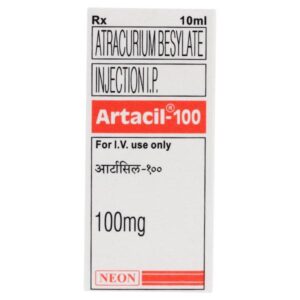ATRACURIUM
ATRACURIUM: ATRACURIUM is a medication known as a non-depolarizing neuromuscular blocking agent. It is primarily used as an adjunct to general anesthesia to provide skeletal muscle relaxation during surgery or mechanical ventilation in the intensive care unit.
The mechanism of action of ATRACURIUM involves competitive antagonism at the neuromuscular junction. It binds to the nicotinic acetylcholine receptors in the motor endplate, preventing the binding of acetylcholine and inhibiting muscle contraction. By doing so, ATRACURIUM induces paralysis and relaxation of the skeletal muscles.
The dose of ATRACURIUM varies depending on the patient’s weight, age, and clinical condition. The recommended initial dose ranges from 0.3 to 0.6 mg/kg, followed by maintenance doses of 0.08 to 0.3 mg/kg. The medication is typically administered intravenously over a period of 1-2 minutes.
Common side effects of ATRACURIUM include flushing, hypotension (low blood pressure), tachycardia (rapid heart rate), and increased salivation. Other potential adverse effects include bronchospasm (narrowing of the airways), hypersensitivity reactions, and prolonged paralysis. It is important to monitor the patient closely for any signs of allergic reactions or respiratory distress during administration.
As with any medication, ATRACURIUM should be used with caution in patients with underlying medical conditions, such as kidney or liver dysfunction. It is essential to administer ATRACURIUM under the supervision of experienced healthcare professionals in a controlled clinical environment.

